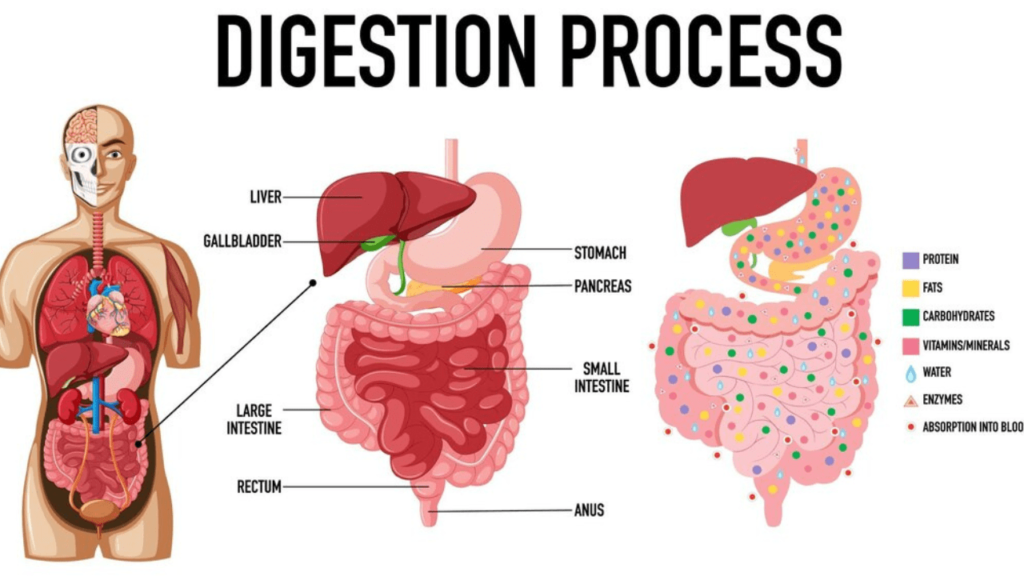The digestive system plays a crucial role in overall health by breaking down food into nutrients, which the body uses for energy, growth, and cell repair. A well-functioning digestive system is essential for maintaining good health and well-being. This article explores simple and effective ways to enhance digestive health, providing practical tips and expert insights to help you achieve optimal digestive function.
Understanding the Digestive System

What is the Digestive System?
The digestive system comprises a series of organs working together to convert food into energy and basic nutrients. It includes the mouth, esophagus, stomach, intestines, liver, pancreas, and gallbladder.
Functions of the Digestive System
- Ingestion: Taking in food through the mouth.
- Digestion: Breaking down food into smaller components.
- Absorption: Nutrients from digested food are absorbed into the bloodstream.
- Excretion: Eliminating undigested food and waste products from the body.
Simple Ways to Improve Digestive Health

Eat a High-Fiber Diet
Fiber is essential for good digestion as it helps to keep food moving through the digestive tract. Include a variety of fruits, vegetables, whole grains, and legumes in your diet.
Stay Hydrated
Drinking plenty of water aids digestion by helping to dissolve fats and soluble fiber, allowing these substances to pass through the digestive tract more easily.
Eat Mindfully
Eating slowly and chewing your food thoroughly can improve digestion. Mindful eating helps in recognizing the body’s hunger and fullness cues, preventing overeating.
Include Probiotics and Prebiotics
Probiotics are beneficial bacteria that promote a healthy gut, while prebiotics are types of fiber that feed these good bacteria. Include foods like yogurt, kefir, sauerkraut, and fiber-rich foods such as bananas, onions, and garlic.
Exercise Regularly
Regular physical activity helps keep food moving through your digestive system, reducing the risk of constipation. Aim for at least 30 minutes of moderate exercise most days of the week.
Manage Stress
Chronic stress can negatively impact your digestive system. Practices such as yoga, meditation, and deep breathing exercises can help manage stress levels.
Avoid Bad Habits
Limit the intake of alcohol, caffeine, and avoid smoking. These can interfere with the functioning of your digestive system and lead to various digestive problems.
Stay Upright After Eating
Lying down after a meal can cause heartburn and indigestion. Try to stay upright for at least two hours after eating.
Foods to Enhance Digestive Health
![]()
Fruits and Vegetables
Rich in fiber and essential nutrients, fruits and vegetables should be a staple in your diet. Examples include apples, pears, broccoli, and spinach.
Whole Grains
Whole grains like oats, brown rice, and quinoa are high in fiber and help in maintaining healthy digestion.
Lean Proteins
Choose lean sources of protein such as chicken, fish, and plant-based proteins like beans and lentils. Avoid fatty cuts of meat that can slow down digestion.
Healthy Fats
Incorporate healthy fats from sources like avocados, nuts, seeds, and olive oil. Healthy fats can help your body absorb certain nutrients.
Expert Insights
Nutritionist’s Perspective
Jane Doe, a registered dietitian, suggests, “Incorporating a variety of fiber-rich foods, staying hydrated, and maintaining regular physical activity are key strategies for supporting digestive health.”
Gastroenterologist’s Advice
Dr. John Smith, a gastroenterologist, emphasizes, “Probiotics and prebiotics play a crucial role in maintaining a healthy gut microbiome, which is essential for efficient digestion.”
FAQs
What are common signs of poor digestive health?
Common signs include bloating, constipation, diarrhea, heartburn, and stomach pain. If you experience these symptoms regularly, it’s important to consult with a healthcare professional.
How can I increase fiber in my diet?
Increase your intake of fruits, vegetables, whole grains, and legumes. Gradually add these foods to your diet to allow your digestive system to adjust.
Are there specific exercises that help with digestion?
Yes, exercises like walking, yoga, and core-strengthening activities can promote better digestion and reduce symptoms of constipation.
Can stress really affect digestion?
Yes, stress can affect the digestive system by altering gut motility and increasing the production of stomach acid, which can lead to digestive issues.
What are some natural remedies for indigestion?
Natural remedies include ginger tea, peppermint, chamomile tea, and avoiding trigger foods like spicy and fatty foods.
Conclusion
Improving your digestive health is crucial for overall well-being. By incorporating these simple yet effective strategies, you can support your digestive system and enhance your quality of life. Remember to stay hydrated, eat a balanced diet rich in fiber, and manage stress levels for optimal digestive health.
Disclaimer
The information provided in this article is for educational purposes only and should not be considered as medical advice. Always consult with a healthcare professional before making any changes to your diet or exercise regimen. Individual health needs can vary, and a professional can help tailor recommendations to suit personal health conditions and goals.
